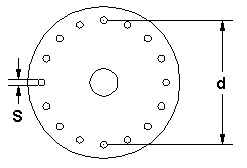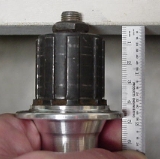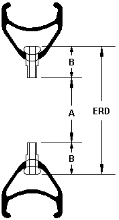Video
You can either watch the following video, which shows you how to measure the dimension, or you can read Damon Rinard's original instructions further below.There are five hub dimensions: dL, dR, S, WL, WR

d, flange diameter is measured between centers of opposite holes in the hub flange. It is usually between 38 and 67 millimeters. Note that it is NOT the outside diameter of the hub's flange. Left and right flange diameters are often, but not always, the same.
S, spoke hole diameter, is the through diameter of any spoke hole. It is usually 2.6 mm.

W, width from center to flange may differ between left and right sides of the hub. In this illustration, WL and WR (in Edd they are called centre to left and centre to right) are the dimensions you enter into the fields for the left and right sides of the hub, respectively. You can use a hub listed in Edd's database, or measure your own hub by following these steps:
- Measure OLD (Over Locknut Distance).
- Measure Dimension A.
- Measure Dimension B.
- WL = (OLD/2) - A.
- WR = (OLD/2) - B.
Not a lot of precision is needed in the width dimensions. A few millimetres error in width will only lead to a fraction of a millimetre error in spoke length.

I usually measure A and B dimensions by holding the hub lock nut against a flat surface (like the edge of my work bench), then measuring from there back to the hub flange with a ruler or caliper. Note that you must hold the lock nut (not the axle end) against the edge.
Of course, I use two hands for better accuracy. In this photo one hand is working the camera!There is one rim dimension: ERD

Effective Rim Diameter (ERD) is the diameter on which you want the ends of the spokes to lie. Most people prefer it near the end of the spoke nipple. If you want to measure your own rim (recommended, just to be sure), then follow these instructions:
- Insert two old spokes into holes exactly opposite each other on the rim. Count holes to be sure.
- Screw some nipples onto the spokes.
- Pull them tight and measure dimension A in the figure (the diameter to the edge of the nipples, where the spokes disappears into them). Do this at several spots around the rim and average the measurements.
- Measure the length of a nipple (dimension B in the figure) and add it twice (once for each nipple).
Effective Rim Diameter (ERD) is the dimension you type into the form field for ERD. Of all the dimensions you actually might measure, ERD is the most critical dimension affecting spoke length, so it makes sense to measure it a few times at different places around the rim. Always count to make sure you use spoke holes that are actually opposite each other!
Asymmetric rims (rims with an offset spoke bed [OSB])

Off Center or Asymmetric rims require a slight adjustment for spoke lengths. I don't know enough about Excel to make Spocalc smart enough to compensate for rim offset, but I have two work-arounds: the easy way and the exact way.
The Easy Way: Calculate spoke length as if the rim were symmetrical. Then add 1mm to the right side and subtract 1mm from the left side on rear wheels, or add 1mm to the disc side and subtract 1mm from the non-disc side of front wheels.
The Exact Way: The idea is to adjust the hub widths to mimic the rim offset. (The change in spoke length is the same whether the rim moves relative to the hub, or the hub moves relative to the rim.) To do this, just change the left and right flange offsets by the rim offset. Here's how to do it step by step: After entering your hub data into Edd's manual hub entry form ("Enter your own measurements"),
Calculate your rim's spoke hole lateral offset
- Measure the rim width (W) and divide by two. This is the rim half-width.
- Measure the distance from the near sidewall to the center of the average spoke hole (L).
- Subtract this number from the rim half-width.
Adjust the centre-to-flange hub dimensions:
- Add the rim offset to centre-to-right width, and
- Subtract rim offset from the centre-to-left width.
Click Calculate to trigger a new calculation.
comments powered by Disqus